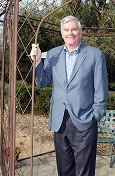In honor of JRP’s 10th anniversary and volunteer appreciation month, we are reposting oldies but goodies. This is from November 2014. Mitch continues to be one of our most engaged and impactful volunteers; thank you, Mitch!
When Mitch Dorger finished ten years as Chief Executive Officer of the Pasadena Tournament of Roses in 2010, he considered getting a new job. But then his wife asked him a question: “Do you really want to work 12 hours a day, six days a week for the next five years?”
He did not. So what does an active retiree do with his new-found free time?
He decided to start his own consulting company (www.dorgerconsulting.com). After all, hadn’t he succeeded at running Air Force bases and providing support for private colleges? Now, he brings his diverse management wisdom to organizations he feels passionate about. He sometimes even consults for free.
“When I retired, I was very happy with the career that I had and the money that we had been able to put away,” he explained. “I was fortunate. I didn’t have to work. I thought about what had been missing from my career and decided I hadn’t done enough to give back to society.”
Dorger realized he was an odd type of consultant. He finds that most consultants are hired because they have in-depth, narrowly focused knowledge. He describes that kind of knowledge as a mile deep and two-inches wide. He always wanted to be more of a Renaissance man, with knowledge two-inches deep and a mile wide.
Now the retired Air Force colonel—he spent 26 years in the Air Force—specializes in what he terms “organizational effectiveness,” which includes leadership effectiveness, governance, strategic planning, and organizational processes and procedures.
He devotes his time because of his passionate belief in the value of nonprofit organizations. This comes from a man who served in the highest-paid position of an organization that generates more than $40 million annually—the Pasadena Tournament of Roses, one of the highest profile nonprofits in California.
“Pasadena has had a tremendous influence on me,” Dorger said. “Besides Washington, D.C., Pasadena has the most nonprofits per capita.” He believes most of the good things here are provided by nonprofits “that make the fabric of life in Pasadena so rich.”
An acquaintance sent Dorger to Jericho Road Pasadena (JRP). Director Melanie Goodyear didn’t have enough volunteers with expertise in board development and nonprofit governance, so was happy to put Mitch to work. Mitch has now volunteered with three organizations that wanted help in board development, including JRP. Beyond volunteering directly with local nonprofits, Mitch also trained a dozen other volunteers to be board coaches, so JRP has been able to significantly increase the number of board development projects in 2014.
“I think that the concept of JRP is a wonderful one because it matches volunteers with skills and organizations that need special skills but do not have the financial capability to hire them: The right concept in the right time with the right people.”
With his passion for nonprofits also comes concern for their leadership and sustainability.
“Nonprofit boards often don’t know what they don’t know,” Dorger said. “We have a shortage of people who can answer the call for board members.” What particularly concerns him is when he sees a board’s lack of involvement or not understanding its responsibilities.
“You have to know what the law requires of you,” he stressed. “You have a fiduciary responsibility to the organization and to the public.” This requirement coincides with his belief in solid procedures and protocols.
“A nonprofit is a business, but it’s not a profit-driven business—it’s mission driven,” Dorger stressed. “You need processes and procedures to make your mission happen.”
“If you don’t have a product or service to earn money, you have to raise money,” he said. “Boards sometimes think that only experts in fundraising can do that, but fundraising is really ‘friend raising’. It’s all about engaging people and sharing the passion of the board members for their organization.”
Mitch Dorger’s advice for nonprofit managers centers on asking for help:
• Don’t be afraid to ask for help, particularly senior managers. Because many nonprofits have such small staffs, there is often only one of you.
• In addition, it’s tough to know all you need to know about a nonprofit organization. You need to seek out training, books, or experts or consultants from JRP to better contribute to society.
• Understand that you’re not going to know everything from experience in one small organization.
“They’re taking up one of the noblest professions that they can,” he said of people choosing to work for nonprofits. “Whether it is human services, culture, the environment or education, they are contributing to the betterment of civilization. They are probably not going to make that much money. Anyone who is entering the nonprofit world to be rich will probably not meet their goals. Take heart in the good that you do contributing to people and society.”
Although he was raised in Virginia, the son of a career military officer, 2014 marks Dorger’s 20th year in California. He and his wife of 46 years never plan on leaving Pasadena.
He does have two passions outside his work: travel and researching his family’s genealogy. Part of that travel involves visiting his two children and three grandchildren.
One nugget he has found in the family tree was that his grandfather worked to finish the Titanic and her sister ship, the Olympic. Fortunately, his grandfather, an apprentice machinist at the time, did not sail on the ill-fated Titanic in April 1912, or else Pasadena would be without a gifted consultant working for gratis.
Many thanks to volunteer Ned Racine for writing this article! Ned communicates in a variety of visual and written media, particularly social media. He has helped nonprofits with their strategic communication plans.

